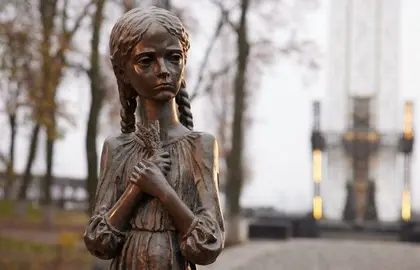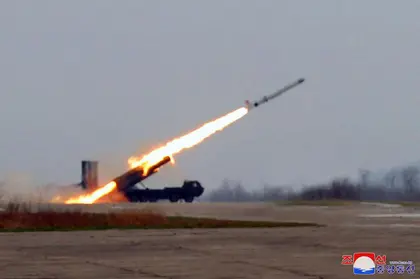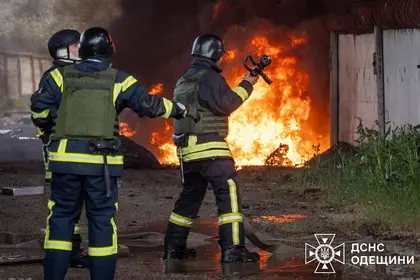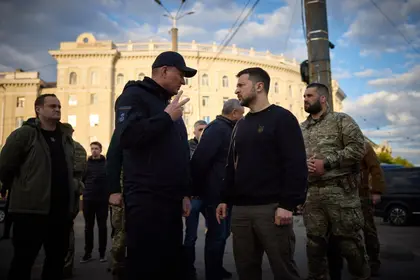Today, Nov. 30, German lawmakers passed a motion recognizing the Holodomor, or death by starvation of millions of Ukrainians in 1932-33, as an act of genocide.
The resolution states that “the mass deaths from hunger were not a result of failed harvests; [rather] the political leadership of the Soviet Union under Josef Stalin was responsible for them.”
It adds that all things Ukrainian were “deeply suspect” to Stalin and notes that “the whole of Ukraine was affected by hunger and repression, not just its grain-producing areas.”
“From today’s perspective, a historical and political classification as genocide is obvious,” the resolution says. “The German Bundestag shares such a classification.”
The chairman of the German-Ukrainian parliamentary group in the Bundestag, Robin Wagener of the Green party, said “[Vladimir] Putin stands in the cruel and criminal tradition of Stalin.”
“Today, Ukraine is once again being overrun with Russian terror. Once again, violence and terror are intended to deprive Ukraine of its livelihood, to subjugate the entire country,” Wagener said, adding that to classify the Holodomor as genocide was a “signal of warning.”
In the deliberations before the vote, Michael Brand of the center-right Christian Democrat party said that Germans are already historically guilty with respect to Ukraine. “If we turn a blind eye now, we will be doubly guilty,” he added.
One dissenting voice came from Gregor Gysi of the left-wing Die Linke party, who used his turn at the podium to call for an immediate ceasefire in this “unwinnable war” between Russia and Ukraine – at which point the moderator interrupted him to say his time was up.
Accounts and interpretations through the years
Awareness of the Holodomor has been slow to come to light in the 90 years since it began. In the 1930s, international reaction to news of starvation in Ukraine was hampered by lack of information – or, in some cases, by a near-criminal downplaying of the event. The most notorious instances of such soft-pedaling were the reports of Walter Duranty for the New York Times, whose series of articles in 1932 on the successes of collectivization and the Five Year Plan won him the Pulitzer Prize.
Shortly after receiving the prize, Duranty dismissed the eyewitness accounts of mass starvation reported by British journalist Gareth Jones as a “scare story.” Duranty also uttered the infelicitous, and now haunting, assessment: “You can’t make an omelet without breaking eggs, and the Bolshevist leaders are just as indifferent to the casualties that may be involved in their drive toward socialization as any general during the World War who ordered a costly attack in order to show his superiors that he and his division possessed the proper soldierly spirit.”
Duranty’s pandering to Soviet authorities during those years has since been exposed and there has been an unsuccessful campaign to strip him of his Pulitzer Prize posthumously.
In the immediate wake of the Holodomor, however, Germany, along with Italy and Poland, had a much more nuanced understanding of the situation in Ukraine than the U.S. or Great Britain.
Information about the famine, in general, was hard to verify, but German diplomats were providing dispatches that attested to the horrors taking place. These documents began to draw the interest of scholars only in the late 1980s.
A paper published by Paolo Fonzi of Berlin’s Humboldt University suggests that Germany, which in 1933 had just experienced the coming to power of Adolf Hitler, was struggling with an ambivalent approach to the Soviet Union. On the one hand, the Nazis needed to continue trade with Bolsheviks; on the other, they feared the prospect of communist expansion.
Fonzi points to the German consulate report from Kharkiv in 1935 that “taxation of the independent peasants, pressure put on them by other means to force peasants to abide to collectivization, famine of the years 1932–33, that has been exploited to induce the peasants to subdue to the Soviet policy, have reached their goal turning the peasants into a ‘docile instrument.’”
The Italians, however, were not as circumspect in their analyses as the Germans. Fonzi cites the Italian consul in Kharkiv, Sergio Gradenigo, from May 31, 1933: “There are no doubts, in fact, that this hunger derives mainly from a famine organized and designed with the intention to ‘teach the peasant a lesson.’”
Thus, over the years, the Holodomor first came to be acknowledged as “artificial.” Then, after the fall of the Soviet Union and the sudden availability of documents previously kept under wraps, the picture of an intentional and systematic effort to liquidate the Ukrainian nation as a bulwark of resistance to the Soviet system became clear.
Since those documents have become available, no historian more than Anne Applebaum has managed to produce a comprehensive account of Stalin’s attempt to intentionally starve the Ukrainian people.
In an interview with Radio Free Europe/Radio Liberty, shortly after the publication of her seminal 2017 book on the Holodomor, the American scholar said it in no uncertain terms:
“The Holodomor was created deliberately by Stalin. There was, in 1932, the beginnings of broad Soviet famine that was caused by collectivization and the grain-requisitions policy. By the autumn of 1932, Stalin decided to make use of this crisis, to use it in order to target Ukraine specifically. And at that time, as my book shows, there were a number of measures taken that specifically affected Ukraine: blacklisting of particular farms and towns and villages, a cordon around the border so that people were unable to leave Ukraine, special measures against Ukrainian cultural institutions and the Ukrainian language.”
Thanks to scholars like Applebaum, Fonzi and a host of others, awareness of the Holodomor has built to the point where governments are less afraid of offending Moscow by pointing to historical facts and giving them their proper names.
While it is impossible, so many years after the fact, to try those responsible for the Holodomor, the awareness of the tragedy keeps growing year by year. Yet now, with Putin’s genocidal terror trying to emulate Stalin’s, Ukrainians can taste the prospect of justice in the very near future.
You can also highlight the text and press Ctrl + Enter






Comments (0)